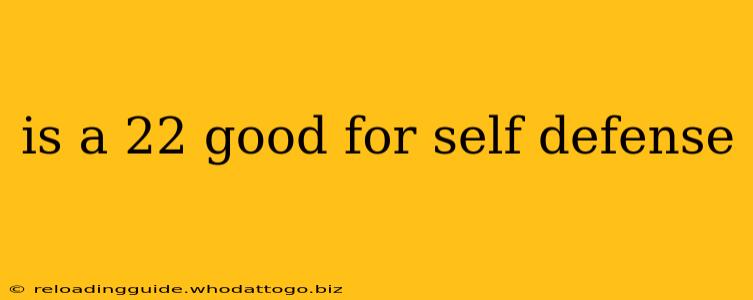Is a .22 Good for Self-Defense? A Comprehensive Look at Caliber Capabilities
The question of whether a .22 caliber firearm is suitable for self-defense is complex and sparks considerable debate among firearms experts and enthusiasts. There's no simple yes or no answer, as the effectiveness depends on various factors beyond just the caliber itself. This article delves into the pros and cons of using a .22 for self-defense, helping you make an informed decision.
Understanding the .22 Caliber:
The .22 Long Rifle (.22 LR) is a ubiquitous cartridge known for its affordability, low recoil, and high velocity. These characteristics make it popular for target shooting, small game hunting, and plinking. However, its suitability for self-defense is a point of contention.
Arguments Against .22 for Self-Defense:
-
Stopping Power: This is the most significant drawback. The .22 LR's relatively small bullet diameter and low mass translate to lower stopping power compared to larger calibers like 9mm or .45 ACP. It may not reliably incapacitate a threat, requiring multiple hits to achieve the desired effect. This increases the chance of the attacker continuing their assault.
-
Penetration: While .22 LR ammunition offers varying penetration levels depending on the bullet type (e.g., hollow point, full metal jacket), it generally has lower penetration than larger calibers. This means it might not penetrate thick clothing or barriers effectively, reducing its effectiveness in a self-defense scenario.
-
Over-Penetration Concerns: While less likely than with larger calibers, over-penetration can still occur with .22 LR, especially with full metal jacket ammunition. This poses a risk to bystanders if a shot misses the intended target.
Arguments For .22 for Self-Defense:
-
High Capacity: Many .22 LR firearms offer high-capacity magazines, allowing for more shots before needing a reload. This can be a significant advantage in a self-defense situation where multiple shots might be necessary.
-
Accuracy and Control: The low recoil of the .22 LR makes it easier to maintain accuracy and control, especially for individuals with less shooting experience. Accurate shot placement is crucial for effective self-defense, regardless of the caliber.
-
Ease of Use: The smaller size and lighter weight of many .22 LR firearms can make them easier to handle and conceal, offering a significant advantage for self-defense in situations where immediate access to a weapon is crucial.
-
Availability and Affordability: .22 LR ammunition is generally more readily available and significantly cheaper than larger calibers, making it a more cost-effective option for frequent practice, which is crucial for proficiency in self-defense.
Conclusion:
Ultimately, the decision of whether a .22 caliber firearm is suitable for self-defense is a personal one. While its stopping power and penetration are arguably less than ideal compared to larger calibers, its high capacity, ease of use, and affordability offer some counterpoints.
Crucial Considerations:
-
Training: Regardless of caliber, proper training is paramount. Knowing how to effectively use your firearm, including accurate shot placement, is far more important than the caliber itself.
-
Situational Awareness: Proactive measures to avoid dangerous situations are crucial. Self-defense should be a last resort.
-
Legal Considerations: Understand and comply with all local and state laws regarding firearm ownership and usage.
-
Alternative Options: Consider larger calibers if stopping power and penetration are your primary concerns. Non-lethal self-defense options such as pepper spray or personal alarms should also be part of your overall safety plan.
This information is for educational purposes only and should not be considered legal or professional advice. Always consult with relevant experts before making decisions about personal safety and firearm ownership.

